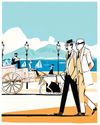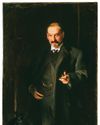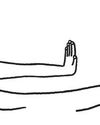
My father had few enthusiasms, but he loved comedy. He was a comedy nerd, though this is so common a condition in Britain as to be almost not worth mentioning. Like most Britons, Harvey gathered his family around the defunct hearth each night to watch the same half-hour comic situations repeatedly, in reruns and on video. We knew the “Dead Parrot” sketch by heart. We had the usual religious feeling for “Monty Python’s Life of Brian.” If we were notable in any way, it was not in kind but in extent. In our wood-cabinet music center, comedy records outnumbered the Beatles. The Goons’ “I’m Walking Backward for Christmas” got an airing all year long. We liked to think of ourselves as particular, on guard against slapstick’s easy laughs—Benny Hill was beneath our collective consideration. I suppose the more precise term is “comedy snobs.”
Left unchecked, comedy snobbery can squeeze the joy out of the enterprise. You end up thinking of comedy as Hemingway thought of narrative: structured like an iceberg, with all the greater satisfactions fathoms under water, while the surface pleasure of the joke is somehow the least of it. In my father, this tendency was especially pronounced. He objected to joke merchants. He was wary of the revue-style bonhomie of the popular TV double act Morecambe and Wise, and disapproved of the cheery bawdiness of their rivals, the Two Ronnies. He was allergic to racial and sexual humor, to a far greater degree than any of the actual black people or women in his immediate family. Harvey’s idea of a good time was the BBC sitcom “Steptoe and Son,” the grim tale of two mutually antagonistic “rag-and-bone men” who pass their days in a Beckettian pile of rubbish, tearing psychological strips off each other. Each episode ends with the son (a philosopher manqué, who considers himself trapped in the filthy family business) submitting to a funk of existential despair. The sadder and more desolate the comedy, the better Harvey liked it.
Bu hikaye The New Yorker dergisinin August 19, 2024 sayısından alınmıştır.
Start your 7-day Magzter GOLD free trial to access thousands of curated premium stories, and 9,000+ magazines and newspapers.
Already a subscriber ? Giriş Yap
Bu hikaye The New Yorker dergisinin August 19, 2024 sayısından alınmıştır.
Start your 7-day Magzter GOLD free trial to access thousands of curated premium stories, and 9,000+ magazines and newspapers.
Already a subscriber? Giriş Yap

BADDIE ISSUES
\"Wicked\" and \"Gladiator II.\"

LET'S MAKE A DEAL
\"Death Becomes Her\" and \"Burnout Paradise.\"

ANTI HEROES
\"The Franchise,\" on HBO.

FELLOW-TRAVELLERS
The surprisingly sunny origins of the Frankfurt School.

NOW YOU SEE ME
John Singer Sargent's strange, slippery portraits of an art dealer's family.

PARIS FRIEND - SHUANG XUETAO
Xiaoguo had a terror of thirst, so he kept a glass of water on the table beside his hospital bed. As soon as it was empty, he asked me to refill it. I wanted to warn him that this was unhealthy - guzzling water all night long puts pressure on the kidneys, and pissing that much couldn't be good for his injury. He was tall, though, so I decided his insides could probably cope.

WILD SIDE
Is Lake Tahoe's bear boom getting out of hand?

GETTING A GRIP
Robots learn to use their hands.

WITHHOLDING SEX FROM MY WIFE
In the wake of [the] election, progressive women, who are outraged over Donald Trump's victory at the ballot box, have taken to social media with public, vengeful vows of chastity. - The Free Press.

DEADLINE EXTENSION
Old age, reborn.